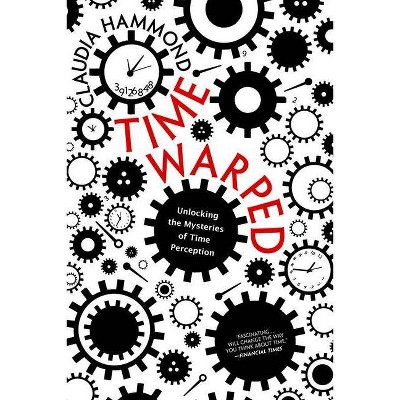Time Warped - by Claudia Hammond (Paperback)

Similar Products
Products of same category from the store
AllProduct info
<p/><br></br><p><b> About the Book </b></p></br></br>Drawing on the latest research from the fields of psychology, neuroscience, and biology, plus original research, writer, and broadcaster Hammond delves into the mysteries of time perception and offers advice for how to better manage time.<p/><br></br><p><b> Book Synopsis </b></p></br></br><p><strong>"...a fascinating foray into the idea that our experience of time is actively created by our own minds and how these sensations of what neuroscientists and psychologists call "mind time" are created." -- Maria Popova, <em>BrainPickings</em></strong></p><p><strong>Drawing on the latest research from the fields of psychology, neuroscience, and biology, writer and broadcaster Claudia Hammond explores the mysteries of our perception of time in her book <em>Time Warped</em>.</strong></p><p>Why does life seem to speed up as we get older? Why does the clock in your head move at a different speed from the one on the wall? Why is it almost impossible to go a whole day without checking your watch? Is it possible to retrain our brains and improve our relationship with it?</p><p>In <em>Time Warped</em>, Claudia Hammond offers insight into how to manage our time more efficiently, how to speed time up and slow it down at will, how to plan for the future with more accuracy, and she teaches how to use the warping of time to our own benefit.</p><p/><br></br><p><b> From the Back Cover </b></p></br></br><p>Why does life speed up as we get older? Why does the clock in your head sometimes move at a different speed from the one on the wall? Time rules our lives, but how much do we understand it? And is it possible to retrain our brains and improve our relationship with it?</p><p>Drawing on the latest research from the fields of psychology, neuroscience, and biology, and using original research on the way memory shapes our understanding of time, the acclaimed writer and BBC broadcaster Claudia Hammond delves into the mysteries of time perception. Along the way, she introduces us to an extraordinary array of characters willing to go to great lengths in the interests of research, including the French speleologist Michel Siffre, who spends two months in an ice cave in complete darkness. </p><p><em>Time Warped</em> offers insight into how to manage our time more efficiently, speed time up and slow it down at will, plan for the future with more accuracy, and, ultimately, use the warping of time to our own advantage.</p><p/><br></br><p><b> Review Quotes </b></p></br></br><br>"...a fascinating foray into the idea that our experience of time is actively created by our own minds and how these sensations of what neuroscientists and psychologists call "mind time" are created."--<strong>Maria Popova, <em>BrainPickings</em></strong><br><br>"A well-researched meditation on how we see the future.... There's one great question of time, one which of course this book cannot answer, but on which it gives a great deal of much-needed perspective: 'How much do I have left?' "--<strong><em>Slate</em></strong><br><br>"In <em>Time Warped</em>, Claudia Hammond... has a steady touch in conveying the research, adding user-friendly charm even to exhaustive descriptions of the mechanics of boredom. A chapter on visualization is particularly intriguing."--<strong>Jascha Hoffman, <em>New York Times</em></strong><br><br>"This is an ideal read for those looking for science-based theories of time perception without the scientific jargon.... Despite the common belief that time moves at a constant pace, Hammond demonstrates how life's circumstances can make minutes seem an eternity and decades the blink of an eye."--<strong><em>Library Journal</em></strong><br><br>"This lively introduction to the psychology of time perception is an intriguing take on the fluidity of reality."--<strong><em>Publishers Weekly</em></strong><br>
Price History
Price Archive shows prices from various stores, lets you see history and find the cheapest. There is no actual sale on the website. For all support, inquiry and suggestion messagescommunication@pricearchive.us




















